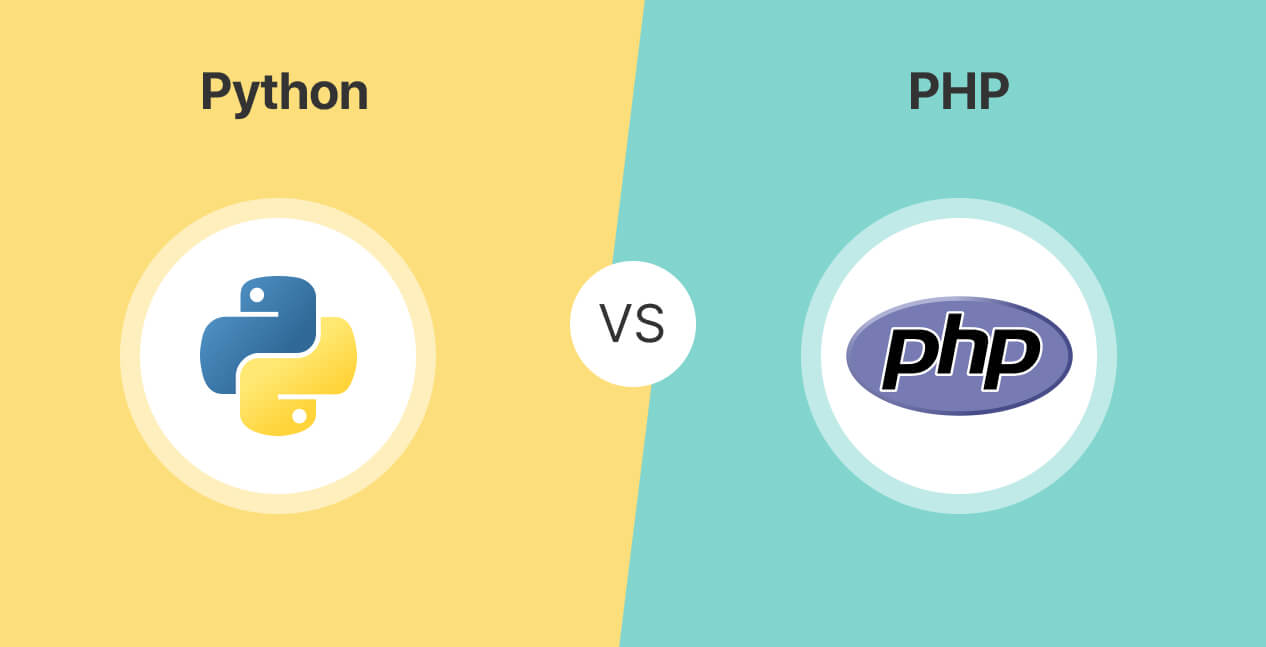Python vs PHP - Introduction
As we humans need languages to communicate, the same is the case between computers and their programs. A set of instructions are communicated through programming languages such as C, C++, Java, or Python. For every software, no one language is ideal. Different projects are better suited to different programming languages and frameworks.
The programming language for any project must be selected depending on the organization’s needs and not just because it is popular. Plenty of programming languages are available, making it difficult for programmers to choose the best one. If we choose one depending on its simplicity, it may not be beneficial later.
If seen in detail, firstly, you need to pay attention to all the aspects of your project. It is advisable to conduct all your research at the beginning, as this will help you search for a suitable programming language for your project. Also, this will help maintain, upgrade, and secure the projects in less time.
Choosing the correct programming language for a project is crucial. Nowadays, most businesses choose Python and PHP as their primary programming languages for web development projects. These are the popular languages known for their solid open-source background and also for providing comprehensive design documentation. Their usage depends on various factors. Today let’s look at their features, advantages, and disadvantages and know which one is better.
Python: Python is a high-level interpreted and object-oriented programming language. It has enormous library support and is used for developing standalone programs and scripting algorithms for various domains.
PHP: PHP is a server-side scripting language. It is used for creating dynamic HTML content over the web. It is popularly used for generating XML documents, Flash animations, graphics, PDF files, and much more.
You can learn about e usage statistics of PHP vs Python
What is Python?
Python is the most popular and commonly used in a variety of applications. The language was first developed in the late 1980s by Guido van Rossum. High-level data structures, dynamic typing, dynamic binding, and many other capabilities make it as helpful for scripting or “glue code” that ties components together as they do for developing sophisticated applications. Additionally, it may be enhanced to execute C or C++ code and make system calls to practically all operating systems.
Python was designed in C and is capable of programming in simple and complex operations. Also, it offers various modules and libraries which allow it to support many different programming languages like Java, C, C++, and JSON.
Features of Python
- It is easy to code
- Using the same user interface, Python can operate on several hardware systems.
- It has an Object-Oriented approach.
- It is simple to read, understand, and keep up with.
- It offers large programs the ideal framework and assistance.
- Incorporating low-level modules into the Python interpreter is simple.
- Python has a large number of inbuilt libraries.
- Python has automated garbage collection capabilities.
- Python can be integrated with C, C++, and Java programming code.
- Python is highly dynamic, which means it allows a type of variable to be decided at the run time and not in advance. This saves time and increases efficiency.
- It helps in an interactive mode of testing and debugging.
Advantages & Disadvantages of Python
As we know what features Python provides, it is also essential to know its advantages and disadvantages. The benefits of utilizing the Python programming language for web development are as follows:
Advantages of Python
- A flexible, object-oriented language that may be used in various industries.
- It increases productivity.
- Easy to use, read, learn, and maintain.
- It has a supportive community.
- Develops GUI applications.
- It can easily integrate with other languages such as Java or C++.
Disadvantages of Python
- As it is an elementary-level language, users have trouble using it with other programming languages.
- A large amount of memory is used.
- Slow in speed compared to other languages.
- As a result of dynamic typing, error detection becomes challenging.
- Huge for a simple and small app or website
- Due to its dynamic nature, there are possibilities of runtime errors.
Why Choose Python?
Python is a straightforward, adaptable, and comprehensive programming language. It is an excellent choice for both learners and experts. Though there are certain disadvantages, its benefits have more weightage. As we have already seen, Python’s features and advantages have attracted new users and continue to. It is a real cross-platform language that functions just as well on platforms like Windows, Linux/UNIX, Macintosh, and other devices like supercomputers and mobile phones. Although it expands effectively, allowing the creation of massive programs, it may be used to create modest applications and quick prototypes. Python is well suited for the rapid development of applications as it takes less time to code than other programming languages.
What is PHP?
The first version of PHP was introduced in 1994 by Rasmus Lerdorf. Since the release, there have been in total 8 versions of PHP till now. PHP stands for Hypertext PreProcessor. PHP is a programming language that conducts server-side scripting. Also, PHP is considered to be secure as it has many hash functions that help encrypt user data. It works with practically every major operating system, including Windows, Linux, and others. Giants like Facebook and Slack use PHP.
PHP is used to create websites, applications, customer relationship management systems, and more. Embedding PHP into HTML is also possible, making it popular among developers as it helps simply HTML code. It also has huge community support. Additionally, it has many resources, such as commands, functions, and codes. PHP has two main applications: server-side scripting and command-line scripting. Further, let us know about its features.
Features of PHP
- Dynamic page content may be produced using PHP.
- PHP is easier to use and program than other scripting languages.
- PHP provides Database integration. Also, supports different databases like MySQL and Oracle.
- PHP can encrypt data.
- PHP creates a list of recent user accesses and uses that list to allow users to log in.
- PHP is more efficient compared to other languages like JSP and ASP.
- It has predefined error reporting constants that produce error messages.
- PHP is an open-source language and can be downloaded free of cost.
Advantages & Disadvantages of PHP
Since PHP was explicitly created for the web, it offers several benefits to web development. There are various. Let’s have a look at some of its advantages and disadvantages:
Advantages of PHP
- PHP is a simple language that makes learning and working with it easy.
- PHP websites and applications typically run very fast.
- PHP has a hugely active online community that helps you whenever you face an issue.
- It is open-source and free, due to which no license fee is needed, and it can be used free to develop software.
- Since PHP’s existence goes back a long time, it is stable.
- PHP is incredibly versatile, both while a project is in progress and once it has been finished.
- PHP has the potential to become an effective language, depending on how the web developer programs it.
- It has efficient unit testing.
Disadvantages of PHP
- It is a poorly written language.
- Not suitable for large-scale web applications.
- Extra features might affect performance.
- It is challenging to modify basic behavior.
Why Choose PHP?
PHP has several advantages, from developing engaging, dynamic, safe, dependable websites and successful websites. PHP is a capable programming language for creating feature-rich websites. That too in less cost and time. PHP has achieved high quality in recent years by being a configurable yet simple to maintain web planning and development platform. PHP, a widely used server-side scripting language, creates feature-rich websites with exceptional functionality.
Selecting PHP for your project may open the door of possibilities for your website as it is scalable and flexible.
Comparison: Python vs PHP:
Now, as we are familiar with both the programming languages Python and PHP, it’s time to carry out their detailed comparison on numerous parameters.
|
Python |
PHP |
|
| Adaptability | It’s crucial to choose a programming language for any project that is simple to understand. When it comes to learning the language, Python definitely wins. | PHP, in comparison, takes a longer time as its variable names are case sensitive, which terminates statements and takes whitespaces and newlines as free-form language. |
| Easy Installation | Python is difficult to install, especially with an OS like macOS X. Also, it gives a tough time if there is a pre-installed version. | PHP is easy to install. Also, it can be run on any operating system with ease. |
| Performance & Speed | Both are good in their own ways. However, Python’s code compilation process is much quicker. | The Developer’s community has worked hard, and performance and speed are commendably increased in version 7. In this factor, PHP is the clear winner. |
| Library Support | Python offers much better and more mature library support. It has an advanced library as well. All the libraries work seamlessly with frameworks and are easy to use. | PHP does not have a robust supporting library. Though in version 7 Composer tool has been introduced, which can pair with other packages and manage the library. |
| Web Frameworks | Both are equal winners here. Python has many customizable web frameworks. | PHP also has a range of web frameworks. Commonly used frameworks are CodeIgniter, Symfony, Laravel, Yii, Phalcon, etc. |
| Flexibility, Scalability, and Versatility | Based on market demands and must be flexible, scalable, and versatile. AI & Ml capabilities keep Python a little ahead with the new generation. | Despite some fantastic language advancements, PHP is less adaptable to changing trends and increasing expectations. |
| Security | Cybersecurity is the biggest concern these days and develops the need for higher security. Python here is more secure and helps you build complex apps. | Comparatively, PHP has several vulnerabilities. |
| Debugging | Both the programming languages have debuggers which brings them into a tie. Python Debugger (PDB) helps achieve better performing and secure apps. | XDebug debugger in PHP helps make the debugging process sooner and completed effectively. |
| Documentation | Both languages have ample documentation available. Python has a more detailed systematic table of content, including all the improvements, tutorials, how to install documents, and many more, making it easy to understand. | Comparatively, PHP is a little complex as it helps developers comment on the pages, leading to a lot of confusion as to which query is resolved or still exists. |
| Community Support | Active and supportive community support is really important. Additionally, there is a sizable developer community for PHP. Well-known YouTube, Pinterest, and other products use Python due to its support. | There’s a vast community of developers available for PHP as well. Facebook uses PHP as its main backend programming language. |
Python or PHP, which one to choose?
The language you choose will ultimately rely on the nature of the project you’re working on and the traits you want to highlight. Though Python has clearly won in comparison, it eventually depends on your project requirements and which programming language will be suitable for your web development.
PHP has been in use for a very long time. However, Python and its new technical support have made their way. One needs to check the questions such as what is your project requirement? What is your target or purpose? In order to answer that question. PHP may be preferable for developing web applications because it is made for that purpose, but Python isn’t so challenging that you should ignore it.
One might also need to check their skills and how fast the team can adapt to the chosen programming language. The conclusion would be that Python and PHP are roughly equal in terms of learning complexity, so concentrate on what you want to construct and work on.
FAQ’s about PHP vs Python
Cybersecurity, being the biggest concern these days develops the need for higher security. You may use its various security features to create intricate apps with cutting-edge functionality and definite objectives. Here Python wins as it is more secure.
Python is used for developing websites and software, task automation, data analysis, and data visualization. It is an easy-to-learn programming language that is famous among beginners to experts.
The best alternatives for PHP are:
- Java
- JavaScript
- Python
- C#
- Ruby
Well-known apps made with Python are:
- YouTube
- Spotify
- Quora
Well-known apps made with PHP are:
- Wikipedia
- Slack
- MailChimp
- WordPress
COMMENT
No Comments found.
DETAILED INDUSTRY GUIDES
Software Development - Step by step guide for 2021 and
beyond | OpenXcell
Learn everything about Software Development, its types, methodologies, process outsourcing with our complete guide to software development.
Headless CMS - The complete guide for 2021 | OpenXcell
Learn everything about Headless CMS along with CMS, its types, pros & cons as well as use cases, and real-life examples in a complete guide.
Mobile App Development - Step by step guide for 2021 and beyond | OpenXcell
Building your perfect app requires planning and effort. This guide is a compilation of best mobile app development resources across the web.
DevOps - A complete roadmap for software transformation | OpenXcell
What is DevOps? A combination of cultural philosophy, practices, and tools that integrate and automate between software development and the IT operations team.
GET QUOTE
INSIGHTS INTO TECH
The inception of ChatGPT in 2022 marked the wide-scale adoption of Artificial Intelligence in application development. In the field of creating mobile apps, AI-powered tools and frameworks have become indispensable…
Read more...
Introduction Most industries have turned to AI to stay ahead of the competition in the evolving tech landscape. The construction industry is no stranger to this trend. The advent of…
Read more...
Introduction Digital transformation needs no introduction; it is evolving as a norm in many industries. The paradigm transition it brings to the retail landscape is evident from the latest predictions.…
Read more...









